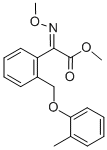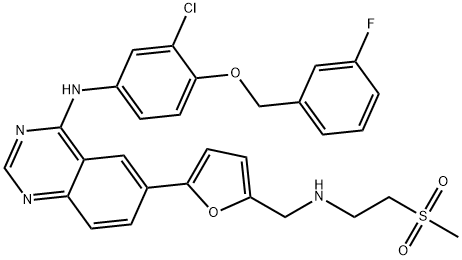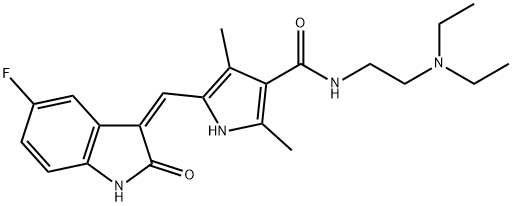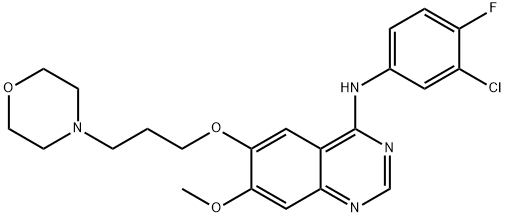Saracatinib
- CAS NO.:379231-04-6
- Empirical Formula: C27H32ClN5O5
- Molecular Weight: 542.03
- MDL number: MFCD09832698
- EINECS: 1592732-453-0
- SAFETY DATA SHEET (SDS)
- Update Date: 2025-01-27 09:38:02
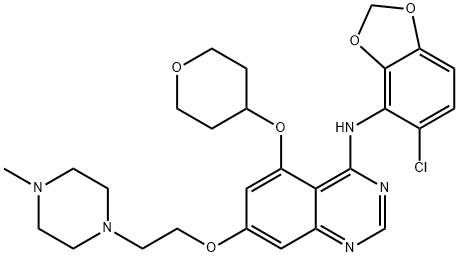
What is Saracatinib?
Description
Saracatinib is a dual inhibitor of the tyrosine kinases c-
Chemical properties
White Solid
The Uses of Saracatinib
An oral, selective dual inhibitor of Src and ABL kinase.
The Uses of Saracatinib
An oral, selective dual inhibitor of Src and ABL kinase. It is a COVID19-related research product.
What are the applications of Application
Saracatinib is a diverse Src inhibitor
Definition
ChEBI: Saracatinib is a member of the class of quinazolines that is quinazoline substituted by (5-chloro-2H-1,3-benzodioxol-4-yl)amino, (oxan-4-yl)oxy and 2-(4-methylpiperazin-1-yl)ethoxy groups at positions 4, 5 and 7, respectively. It is a dual inhibitor of the tyrosine kinases c-Src and Abl (IC50 = 2.7 and 30 nM, respectively). Saracatinib was originally developed by AstraZeneca for the treatment of cancer but in 2019 it was granted orphan drug designation by the US Food and Drug Administration for the treatment of idiopathic pulmonary fibrosis (IPF), a type of lung disease that results in scarring (fibrosis) of the lungs. It has a role as an antineoplastic agent, an EC 2.7.10.2 (non-specific protein-tyrosine kinase) inhibitor, a radiosensitizing agent, an autophagy inducer, an apoptosis inducer and an anticoronaviral agent. It is a member of quinazolines, a secondary amino compound, a N-methylpiperazine, an aromatic ether, a member of oxanes, a member of benzodioxoles, an organochlorine compound and a diether.
storage
Store at -20°C
References
Hennequin et al. (2006), N-(5-chloro-1,3-benzodioxol-4-yl)-7-[2-(4-methylpiperazin-1-yl)ethoxy]-5-(tetrahydro-2H-pyran-4-yloxy)quinazolin-4-amine, a novel, highly selective, orally available, dual-specific c-Src/Abl kinase inhibitor; J. Med. Chem., 49 6465 Green et al. (2009), Preclinical anticancer activity of the potent, oral Src inhibitor AZD0530; Oncol., 3 248 de Wispelaere et al. (2013), The small molecules AZD0530 and Dasatinib inhibit dengue virus RNA replication via Fyn kinase; Virol., 87 7367 Shin et al. (2018), Saracatinib Inhibits Middle East Respiratory Syndrome-Coronavirus Replication In Vitro; Viruses, 10 283 Tang et al. (2020), Fyn kinase inhibition reduces protein aggregation, increases synapse density and improves memory in transgenic mice and traumatic Tauopathy; Acta Neuropathol. Commun., 8 96 Kaufman et al. (2015), Fyn inhibition rescues established memory and synapse loss in Alzheimer mice; Neurol., 77 953
Properties of Saracatinib
| Melting point: | 84-89°C |
| Boiling point: | 671.2±55.0 °C(Predicted) |
| Density | 1.348 |
| storage temp. | -20°C |
| solubility | Soluble in DMSO (50 mg/ml) and ethanol (54 mg/mL with warming) |
| form | solid |
| pka | 7.55±0.10(Predicted) |
| color | White |
| Stability: | Stable for 2 years from date of purchase as supplied. Solutions in DMSO or ethanol may be stored at -20°C for up to 3 months. |
Safety information for Saracatinib
| Signal word | Warning |
| Pictogram(s) |
 Exclamation Mark Irritant GHS07 |
| GHS Hazard Statements |
H317:Sensitisation, Skin H319:Serious eye damage/eye irritation |
| Precautionary Statement Codes |
P280:Wear protective gloves/protective clothing/eye protection/face protection. P305+P351+P338:IF IN EYES: Rinse cautiously with water for several minutes. Remove contact lenses, if present and easy to do. Continuerinsing. |
Computed Descriptors for Saracatinib
New Products
3-Iodophenylacetic acid 3-Pyridineacetonitrile, α-hydroxy- 2-Propanamine, 1-chloro-, hydrochloride (9CI) 3-(hexyloxy)-4-(pyridin-3-yl)-1,2,5-thiadiazole 2-Hexyn-1-ol Dibenzo-18-crown-6 Nickel(II) perchlorate hexahydrate, 98% 4-Bromophenylacetonitrile, 95% 3-Bromo-4-fluoroaniline, 97% Sodium tetraborate decahydrate, 98% Palladium(II) acetate, trimer, Pd 99% 4-Bromo-2-chlorotoluene, 97% N N Dimethylformamide Dimethyl Acetal (Dmf Dma) 2,3-Dichloro Benzoyl Cyanide [Side Chain] Bis(2-Chloroethyl) Amine Hydrochloride L-Glutamic Acid Diethyl Ester Hydrochloride 5-(Difluoromethoxy)-2-Mercaptobenzimidazole 1-Ethyl-3-(3-Dimethylaminopropyl)-Carbodiimide Hydrochloride [EDC Hcl] 1,4-Napthoquinone Bromoiodomethane Sodium Bicarbonate Methylene Dichloride (MDC) Ethyl Acetate Indole-3-Carbinol (I3C)Related products of tetrahydrofuran
You may like
-
 Saracatinib >95% CAS 379231-04-6View Details
Saracatinib >95% CAS 379231-04-6View Details
379231-04-6 -
 Saracatinib 95% CAS 379231-04-6View Details
Saracatinib 95% CAS 379231-04-6View Details
379231-04-6 -
 AZD0530 CAS 379231-04-6View Details
AZD0530 CAS 379231-04-6View Details
379231-04-6 -
 17604-74-9 3-Pyridineacetonitrile, α-hydroxy- 98+View Details
17604-74-9 3-Pyridineacetonitrile, α-hydroxy- 98+View Details
17604-74-9 -
 Cyclohexane, (2-propynyloxy)- 67967-07-1 98+View Details
Cyclohexane, (2-propynyloxy)- 67967-07-1 98+View Details
67967-07-1 -
 2-Propanamine, 1-chloro-, hydrochloride (9CI) 98+View Details
2-Propanamine, 1-chloro-, hydrochloride (9CI) 98+View Details
5968-21-8 -
 3-Iodophenylacetic acid 1878-69-9 98+View Details
3-Iodophenylacetic acid 1878-69-9 98+View Details
1878-69-9 -
 132945-75-6 (S)-1-Boc-3-methanesulfonyloxy-pyrrolidine 98+View Details
132945-75-6 (S)-1-Boc-3-methanesulfonyloxy-pyrrolidine 98+View Details
132945-75-6


